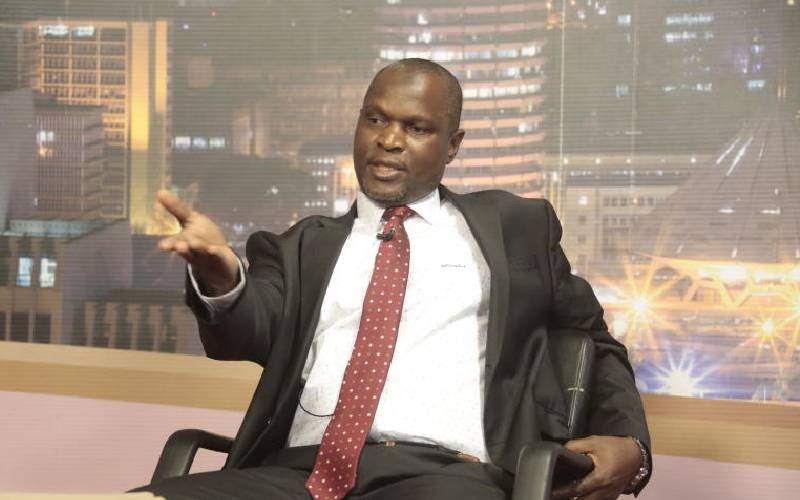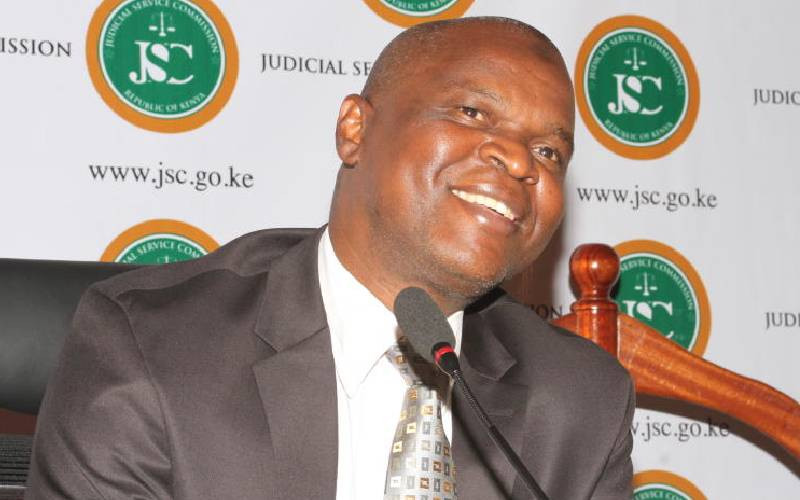
Justice Said Juma Chitembwe steadily built his name in the legal world for 32 years.
However, his downfall, which was affirmed by the Supreme Court yesterday could be summed up with a Swahili proverb: ‘kikulacho ki nguoni mwako’ directly translates to ‘whatever eats you up is in your clothes’.
Little did the judge know that his relative, former Nairobi Governor Mike Sonko Mbuvi, would be the one to draw the dagger and drive it through his back, ending his career. Chitembwe and Sonko are related through marriage.
When Chitembwe appeared before Judicial Service Commission (JSC) on April 12, 2021, interviewing candidates to replace Justice David Maraga as the Chief Justice and the President of the Supreme Court, the man wept.
Justice Chitembwe shed tears as he reflected on how he was accused and tried for corruption. He was later acquitted. The judge had been charged with abuse of office when he served as secretary of the National Social Security Fund.
“It’s good you have asked these questions. As you sit as a judicial officer, you should be able to sift out what has been brought for serving other purposes and what has been genuinely brought as a court case,” he told the panelists.
However, the Kwale-born judge did not sift through the purpose of Sonko’s visit to his residence at the time Nairobi County Assembly had impeached the governor, and a case to save the county boss’ political career was before a bench that he was heading. This is what ‘ate’ him.
Sonko’s men secretly video-recorded him during the visit and thereafter, when the bench dismissed the case, they unleashed on social media what they termed as damning evidence against Chitembwe.
Probably, if the case would have gone Sonko’s way, the videos would not have surfaced.
In his second appearance before the commission, Chitembwe was not looking for a higher position but to put up a fight to save his job.
Supreme Court on Thursday okayed the tribunal’s finding that he should be removed from office.
Justices Mohammed Ibrahim, Njoki Ndung’u, Isaac Lenaola and William Ouko were unanimous there was evidence that Chitembwe’s conduct was in breach of the Code of Conduct and Ethics and also amounted to gross misconduct or misbehavior contrary to Article 168(1) (b) and (e) of the Constitution.
“Ultimately on this ground, we find that the petitioner was engaged in the subversion of justice by commenting on pending cases and suggesting to a litigant, possible points for the challenge of the judgment arising from the consolidated petitions contrary to Article 75(c) of the Constitution, and Regulation 18 of the Code of Conduct and Ethics.
“His conduct, apart from being unprofessional was also unbecoming of a judge and contravened Articles 73 of the Constitution as well as Regulations 15, 16(a), (b), (c) and 17(3) of the Code of Conduct and Ethics,” the bench headed by Justice Ibrahim ruled.
The tribunal that was probing his conduct, headed by Court of Appeal Judge Mumbi Ngugi, handed 250-page report to President William Ruto.
In the report, the judge’s original sin setting is Malindi, back in 2015 where he was stationed as a judge.
In December of the previous year, Jane Mutulu Kyengo, a class eight dropout from Kwale and former beach waitress, lost her white husband Peter Werner, cremated him and distributed his property by his wishes.
Barely three months later, Sonko offered to purchase impressive beach properties left by Werner and registered in the names of two companies, Pacific Frontiers Sea Ltd and Okapi Estate Ltd.
Planning the deal
To regularize ownership, Kyengo crisscrossed Kwale, Mombasa and in Kilifi, which was Justice Chitembwe’s area of jurisdiction to file the succession cause, presenting the properties as wholly owned by Werner when in fact they were owned by companies.
She did not disclose to the court that the deceased had children namely Kasten, Christine and Thomas - who she later said she informed them of their father’s death, and that they allowed her to bury him.
A succession battle ensued. Meanwhile, the other directors of the companies, ‘three Maasais’ (their names were not revealed), emerged and challenged the grant. Unfortunately, for them, consent was registered in July 2016 and adopted by the court as its order. In August 30, 2016, Kyengo got the all crucial order and proceeded to register the properties in her name.
A few months later on December 14, 2016, in a single day, Kyengo transferred and obtained the title for one of the properties, parcel No.779 to one Amana Saidi Jirani.
Jirani was also Chitembwe’s relative. The judge admitted in an interview with the Kenya Television Network (KTN) that he knew Jirani.
It emerged that Jirani was holding the property as his proxy.
Kyengo said she handed over the property ostensibly for safe-keeping and “protection from third parties.” With the title now firmly in Jirani’s name, and Sonko elected the governor of Nairobi, Kyengo entered into a fresh sale agreement on November 7, 2017, to sell him two properties, parcel No.779 and parcel No. 1222, the latter still in Kyengo’s name.
Of the Sh35 million agreed sale price, Sonko gave deposit of Sh3.5 million, and obtained the original titles of the two parcels. Thereafter in early 2021, he struck a goldmine when Nepalese Consulate agreed to buy the said properties for a cool Sh305 million.
In the meantime, the other ‘maasai’ owners of the companies moved to the Court of Appeal to challenge the Malindi succession cause on account of the undisclosed particulars among other things. Another party, a Mr Wekesa placed a caution on parcel No. 779.
The Court of Appeal eventually set aside the High Court Judgement. It is here where the drama begun.
Release a penny
The consulate was hesitant to release a penny before ownership was settled, and Sonko was eager to cash in on the sale. At the political level, Sonko was now being haunted in Nairobi, and in Kwale, Sh305 million was slipping away from his grasp.
Negotiation to secure the deal began, and with it, secret recordings that eventually gave away Justice Chitembwe’s career in the bench, and soiled his reputation.

According to the evidence adduced by Sonko, he and the judge agreed to team up to undertake the multi-million transactions smoothly. That would involve a lot of negotiation as to who would get what from sale, including the parties at the Court of Appeal who were standing in the way of the deal.
“It was his evidence that the judge insisted that some money be brought to his house in dirhams and dollars and that the ‘Maasai’s’ be dealt with through their advocate,” the report read in part.
From the report, it turns out every other person in the Sonko web, except the judge, was recording each other.
When the tribunal tabled a recording depicting Kyengo saying she had received Sh8 million from Justice Chitembwe and further Sh28 million from Sonko, Kyengo tabled her recording to prove that Sonko coached her to say so to convince the Nepalese that the deal was lined up properly.
A lot more recordings were tabled in the tribunal. In another recording at Justice Chitembwe’s home, the judge was heard to mention the word “thirty” which Sonko claimed was a reference to Sh30 million the judge said was to be delivered to one of his colleagues who had stepped in for him and delivered the judgment in the Malindi Succession Cause.
There were other recordings made in the Judge’s Nairobi home, Sonko’s Upperhill office, in cars while on transit. Sonko testified that the three-hour life battery of his recording devices failed him once at the judge’s residence, and forced him to rely on his memory of the discussions.
The recordings feature discussions on the land transaction, his court battles to save his govern seat, favours to colleagues and feature different discussants, and different subjects. In most of them, Jirani is a principal player.
In one recording at Sonko’s Upperhill office, Jirani called the Judge at the behest of another Nairobi lawyer who was seeking help on a client. According to the evidence tendered by Sonko, the judge said his colleague was demanding Sh5 million to conclude the matter, plus his commission of Sh1 million.
In the report, Sonko freely spoke to what appeared to be attempts to bribe Court of Appeal judges in the matter of his impeachment, through the judge. He is quoted in the report discussing several judges, among them one whom he thought was a born again Christian and therefore did not take bribes.
Senior Counsel Kiragu Kimani was the tribunal’s lead counsel assisted by Senior Assistant Director of Public Prosecution (DPP) Joseph Riungu. The two called 25 witnesses.
Chitembwe chose not to call anyone. He took the witness stand and gave sworn evidence.
He flatly denied some of the meetings, including those cited at his Diani residence in Kwale and Mountain View estate in Nairobi, ever took place.
Mobile phone nails him
Mobile technology experts called to testify placed his mobile devices near the same locations as those claimed by Sonko.
In his defense, the judge said he was not that close to Sonko to warrant him to opt-out. He also said the so-called “legal advice” to Sonko on how to approach the appeal was merely a way of calming him down. In any case, the window for staging the appeal had since lapsed.
On the discussions involving the Kwale properties, the judge claimed he was acting as a mediator in the deal on account of knowing the parties. He flatly denied that Jirani was his agent, claiming he only dealt with him as a research assistant in a scholarly venture he was involved in.
He admitted asking Jirani to call Sonko after he (the judge) was arrested in Milimani saying he needed to “lecture them” for causing his arrest. The judge had been arrested alongside another colleague in an alleged corruption incident.
The tribunal weighed the evidence in five claims.
On claims that the judge lacked impartiality and failed to disclose a conflict of interest while dealing with Sonko’s case, the tribunal found that there was overwhelming evidence to warrant his removal from the Judiciary.
The second allegation was that the judge lacked integrity on account that he failed to exercise his judicial functions independently by engaging with persons who were litigants in matters that were before him.
He was further found guilty of lack of accountability, involvement in corrupt practices and impropriety by presiding over a succession case in Malindi in which he had an interest in acquiring one of the properties in dispute.
The final allegations were that the judge engaged in the subversion of justice by commenting and advising a litigant on matters pending before the court, lack of professionalism and unbecoming conduct as a judge.
At the Supreme Court, he challenged the admissibility of the video evidence and other recordings, arguing that was illegally obtained evidence. At the same time, he argued that the recordings were meant to entrap him and they had been modified to fit Sonko’s alleged revenge narrative.
The court found that although the videos and audio were covertly recorded by participants in the conversations.
According to the Supreme Court, Chitembwe invited the participants to his house. The court also found that for entrapment to stand, there must be authorities, law enforcement officers or government agents involved, and they must have provided an opportunity for the commission of a crime.